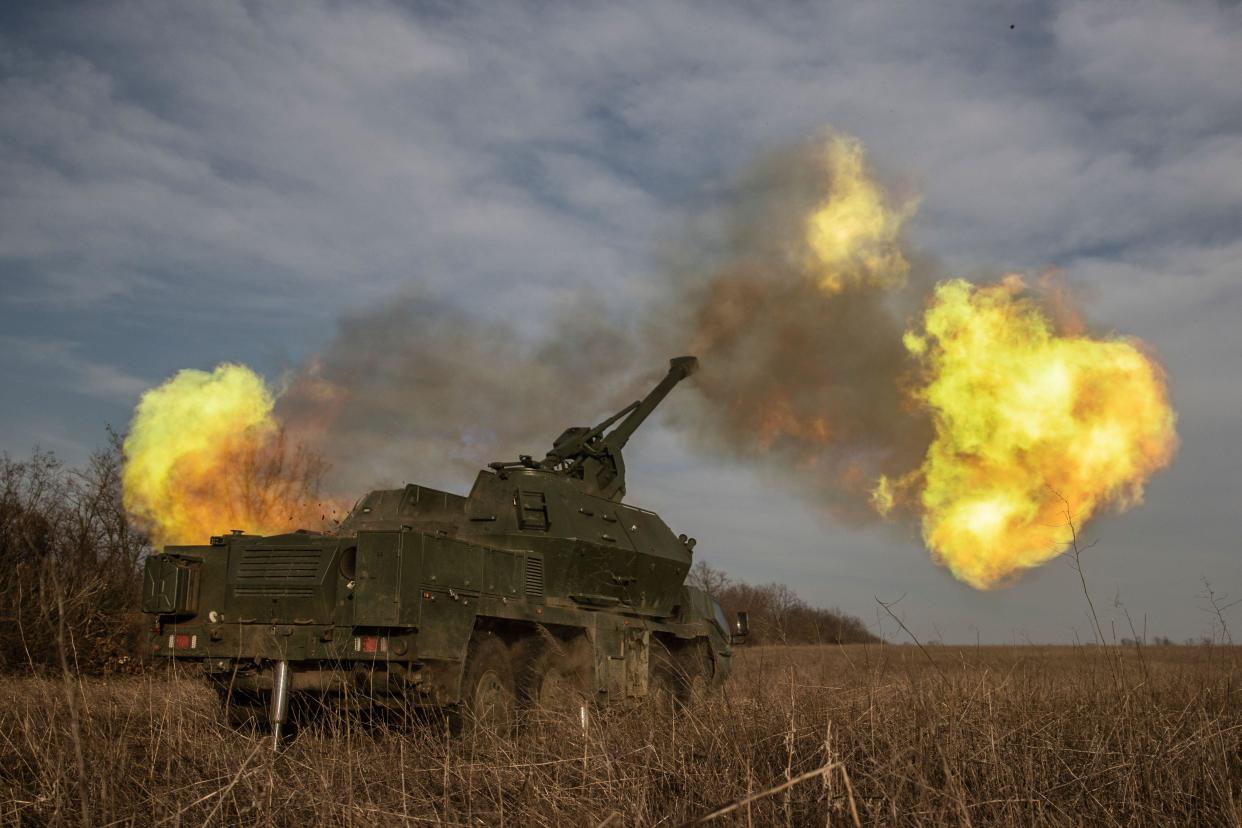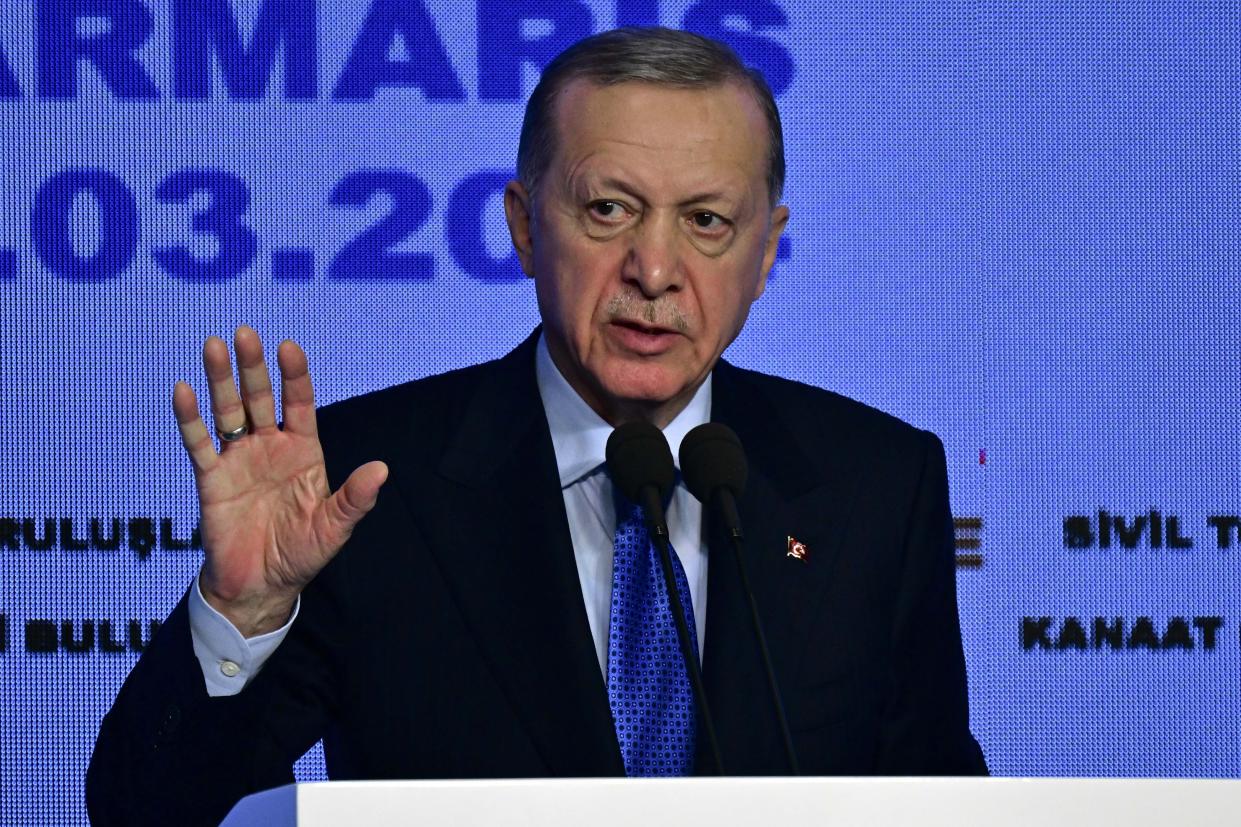How likely is a ceasefire between Russia and Ukraine?

Both sides of the conflict in Ukraine have "reached the limits of what they can get by war", Turkey has said, as it pushes for a ceasefire between the two nations.
Having met his Russian counterpart Sergei Lavrov on Friday, Turkish foreign minister Hakan Fidan told reporters on Sunday: "We think that it is time to start a dialog for a ceasefire. That doesn't mean recognising the occupation (by Russia), but issues of sovereignty and ceasefire should be discussed separately."
Meanwhile China has said it ready to promote peace talks and act as a mediator, adding that would be impossible to discuss a peace settlement without Moscow's participation.
More than two years into the war, Ukraine and Russia have been engaged in sluggish attritional warfare, with heavy casualties on both sides, and Kyiv's prospects have been looking increasingly bleak as Congress members in the US continue to stall over additional military aid.
Here, Yahoo News takes a look at how likely a Ukraine ceasefire could be, what negotiations could look like, and what could happen next.
How likely is a ceasefire in Ukraine?
In January, Ukraine's President Volodymyr Zelenskyy said a ceasefire would not lead to political dialogue and would only benefit Russia, giving it a chance to boost its supply of munitions.
Mikhail Khodorkovsky, a Russian oligarch and opposition activist who was jailed in Russia, made a similar point last year. Writing for Politico, he said: "Such attempts to persuade Ukraine to negotiate with him would be an error — and no ceasefire agreed under the current circumstances would bring peace in the long-term."
He added that Putin doesn't view the war as "catastrophic", and that Russian society "at large seems to accept his narrative of a 'defensive war' and is prepared for significant hardships". Having put the Russian economy on the war footing, the president appears ready to play the waiting game.
Khodorkovsky added that Western sanctions are biting, but are not crippling the Russian economy, adding that Putin is "banking on the West growing weary of the war, hoping and waiting for an American government more willing to abandon some of its European interests".
Putin has previously said he is open to peace talks, but Western officials have suggested he is waiting for the US presidential elections in November, in the hope Trump will be mediating the process, Euractiv reported.
Kyiv has remained firm on its demand for Russian forces to leave Ukraine's territory, including Crimea and the Donbas regions, which are contested by Moscow in particular.

How could peace in Ukraine be negotiated?
Conflict negotiator Pierre Hazan has given some insight into how peace talks between Ukraine and Russia could look.
In an interview with British think tank Chatham House, he suggested the role of the United Nations in such processes has been "marginalised" as the international order becomes increasingly "fragmented".
He suggests this role is being taken on by key players who have "entered the field of mediation" in international conflicts, including Qatar, China and Saudi Arabia.
Turkey is in a fairly unique position, as it is a Nato member that has managed to maintain friendly relations with Russia and has been unwilling to impose its own sanctions on Moscow. This put Ankara in a position to help negotiate a deal to allow grain shipments to pass peacefully through the Black Sea.
On Wednesday Turkish President Recep Tayyip Erdogan said his country is ready to host negotiations between Russia and Ukraine, arguing not enough progress has been made to establish peace.
Speaking at the Southeast Europe summit in the Turkish city of Antalya, he said he agreed with President Zelenskyy's 10-step peace formula in "principle".
However, writing for the Council on Foreign Relations, Nona Mikhelidze, a senior fellow at the Institute of International Affairs, and research coordinator Riccardo Alcaro, suggested a negotiated settlement could simply result in a "frozen conflict" in which both parties "continue to pursue their original objectives".
"What would such a settlement look like? Surely, it would not be a peace treaty," they said. "Russia would not agree to withdraw its troops from territory it has formally annexed.
"Ukraine would never recognise Russia’s territorial acquisitions, which would continue to be Ukrainian land under international law. The West would keep the sanctions regime in place. The frontline would remain militarised."

Could China get involved?
In February Swiss foreign minister Ignazio Cassis said he hoped China would "give us a hand" in Ukraine peace talks, after Switzerland agreed to host a global summit on peace in Ukraine in the near future.
China's Xi Jinping and President Putin declared a "no limits" partnership in Beijing just three weeks before Russia's invasion. Since then, China has dramatically increased its Russian energy imports.
While the US expressed deep scepticism over a proposed peace plan by China in March 2023, Beijing also accused Washington and Nato of a "Cold War mentality" over the conflict. Referring to Ukraine's ambition to join Nato – a major sticking point for Russia – the Chinese proposal said: “The security of a region should not be achieved by strengthening or expanding military blocs.”
Despite the White House's suspicions, Cassis said he wants China at the table precisely because of its great relations with Russia. Cheng Chen, professor of political science at the University of Albany, told the South China Morning Post that Beijing is the only major power that could exert “substantive pressure” on Russia, but said it would only "do so when it feels like it is in China’s interest".


